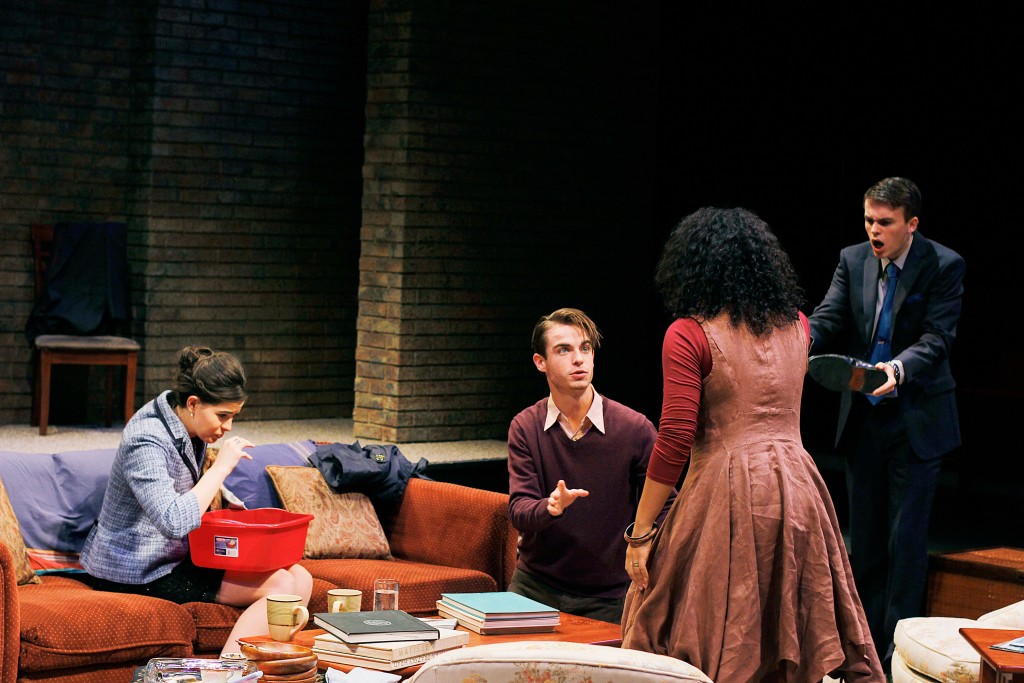
Two families’ sons get into a playground fight. Quickly escalating, one hits the other in the face with a branch, knocking out two teeth. The mortified parents get together to discuss how to proceed: who will pay for the dental surgery? How will the children apologize to each other?
For most parents, this would be where their adult behavior should really shine through, but for the characters of Yasmina Reza’s dark comedy “God of Carnage” — the first play in the Binghamton University theatre department’s Mainstage season — this is where civilities end.
“This play raises the question, ‘Should I be socially conscious and concerned about the world, or should I say screw it?’” said Thomas Kremer, a professor of theatre and director of the show. ”It’s all going to be screwed up anyway and falling apart, so why should I waste my energy?”
Though the characters of the play do not immediately fall prey to these questions, they soon engage in desperate attempts to remain courteous with each other. As the play continues, the claws come out and characters agree that “behaving well gets [them] nowhere,” as Veronica, played by Stephanie Gomerez, a senior majoring in theatre, says onstage.
And that bad behavior is prevalent. Every innocent subject the sets of parents talk about, ranging from family pets to art history, gives way to the means of racism, misogyny and homophobia with complete disregard for what may or may not be socially correct.
Ironically, the characters remark throughout the play of how good it is that they can communicate like adults, without turning to the same antics that their children did on the playground. What they miss completely is that the “mature” discussions they have are far more vicious.
The cast only consists of four characters, with the actors rarely being found offstage. Additionally, the production is staged with the audience sitting on three sides of the set, so there’s no point at which the performers can really focus away from their character. However, the cast all agrees that this is something that helped them grow closer through the rehearsal process, which has been strenuous due to the subject matter of the play and the amount of fighting the actors are required to do.
“This is such a physical show, and we’re all exhausted,” said Emily Mahoney, who plays Annette and is a senior majoring in theatre. “But we’re all having so much fun that it doesn’t really matter.”
For professor Kremer, the “playful” aspect of the production is one of the most important parts of acting. For this show, he says that he tried to make the rehearsal process as lighthearted as it could be to offset the scripted tension between the actors.
“In the beginning, I didn’t know Emily very well,” said Spencer Rosner, who plays Michael and is a sophomore majoring in integrative neuroscience. “And I felt bad when I would scream at her.”
The atmosphere created in rehearsals, however, allowed the cast to be comfortable in their scene work and grow closer.
“The topics in this show sometimes get to a heavy point,” Gomerez said. “If [the rehearsal process] was serious all the time, we would never be able to go as far as we have with each other. We know that once we leave this studio, we’re all friends. There’s no hard feelings.”
Though the play speaks harshly to the act of becoming less human with one another, there are moments of vulnerability for each character throughout the show that the audience will relate to.
“There’s something that the audience can take away from each and every character,” Gomerez said. “They’re all on such opposite spectrums.”
Tom Mackin, who plays Alan and is a junior majoring in comparative literature, agreed.
“[The play] dislodges some universals,” Mackin said. “It introduces them, and then it knocks them down. That’s what’s so good about the argument of the play — that it doesn’t conclude on any one character’s point.”
This lack of conclusion calls into question which morals were the “right” ones. Is it possible, or even necessary, to behave politely? Or do we, without fail, fall victim to the idea of the “God of Carnage”?
“God of Carnage” will be running at 8 p.m. on Oct. 15, 16, 17, 22, 23 and 24 with 2 p.m. performances on Oct. 17, 24 and 25.


